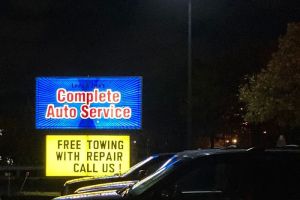Understanding the Importance of Your Car's Air Filter Housing
When it comes to car maintenance, one of the often overlooked components is the air filter housing. This critical part of your vehicle plays a major role in ensuring that your engine receives clean air, free from debris and contaminants. The air filter housing serves as the protective casing for the air filter, keeping it safe from dirt and moisture that could cause the engine to run inefficiently or even suffer serious damage. However, like many other parts of a car, the air filter housing can become damaged over time, especially after exposure to harsh weather, road debris, or improper handling during maintenance. In this guide, we will walk you through the process of identifying and fixing a damaged air filter housing, a task that can be surprisingly straightforward if you follow the right steps.

Firestone Complete Auto Care
1933 N Placentia Ave, Fullerton, CA 92831, USA
Common Causes of Air Filter Housing Damage
Understanding how the air filter housing can get damaged is key to knowing how to fix it. Some of the most common causes include:
- Cracking due to heat exposure: Over time, the plastic housing material can become brittle from the heat generated by the engine.
- Impact damage: Small rocks or debris kicked up by the road can cause cracks or dents in the housing if they strike it with enough force.
- Improper installation: If the air filter housing was not properly installed after a previous service or cleaning, it may not sit securely, leading to damage.
- Moisture buildup: If water or moisture enters the air filter housing due to poor sealing, the internal components can deteriorate or cause rusting over time.
How to Identify a Damaged Air Filter Housing
Before you can fix a damaged air filter housing, you need to know how to recognize the signs that it's broken or compromised. Here are some common symptoms of damage:
- Visible cracks or holes: Inspect the housing for any visible cracks, holes, or pieces that might have broken off. A physical inspection is usually the easiest way to identify a problem.
- Unusual engine sounds: If the air filter housing is not securely sealed, you might hear hissing or whistling noises coming from the engine, indicating that air is leaking in.
- Decreased engine performance: If the air filter housing is damaged, it can affect the airflow to your engine. This may cause a decrease in engine power, poor fuel efficiency, or difficulty starting the car.
- Check engine light: A damaged air filter housing can lead to an imbalance in the air-fuel mixture, which could trigger the check engine light on your dashboard.
Step-by-Step Guide to Fixing a Damaged Air Filter Housing
If you've identified that your car's air filter housing is damaged, it’s time to get down to the repair process. Here’s a step-by-step guide on how to fix it:
- Gather the necessary tools: You will need a set of screwdrivers, wrenches, a new air filter housing (if replacement is necessary), silicone sealant, and a cleaning solution for the air filter housing.
- Locate the air filter housing: The air filter housing is typically located near the engine bay. Depending on the make and model of your vehicle, it may be mounted on one side or directly on top of the engine.
- Remove the damaged housing: Carefully unscrew or unclip the housing from its position. Take note of how it’s connected to ensure you can reassemble it properly.
- Clean the area: Before installing the new or repaired housing, clean the surrounding area. Remove any dirt, debris, or moisture that may have accumulated around the air filter compartment.
- Install the new or repaired housing: If you’re replacing the air filter housing, place the new housing in position and secure it. If you’re repairing it, use silicone sealant to patch any cracks or holes. Ensure the housing is tightly sealed and properly aligned.
- Reattach the air filter: Once the housing is secured, replace the air filter inside. Make sure it's positioned correctly to ensure optimal performance.
- Test the car: Start the engine and check for any unusual noises or performance issues. If the engine runs smoothly and the check engine light remains off, your repair was successful.
When to Seek Professional Help
While repairing a damaged air filter housing can be a manageable task for many car owners, there are instances when it might be better to seek professional help. If the damage is extensive or if you’re unsure about performing the repair yourself, consulting a professional mechanic can save you time and ensure the job is done correctly. Additionally, if the housing is severely cracked or if there’s any doubt about the air filter’s condition, it’s a good idea to have the entire system checked by a professional.

Complete Auto Service of Ann Arbor
2890 Jackson Ave, Ann Arbor, MI 48103, USA
How to Prevent Future Damage to the Air Filter Housing
Preventing damage to your air filter housing is easier than repairing it. Here are some tips to help you maintain the integrity of the housing and ensure it lasts longer:
- Regular maintenance: Inspect the air filter housing regularly for signs of wear and tear. Replacing a damaged filter or housing early can prevent more serious issues.
- Avoid rough driving: Avoid driving over rough terrain or through deep puddles that might cause impact damage or moisture buildup in the housing.
- Proper installation: Always ensure that the air filter housing is properly installed and securely fastened after any maintenance work.
Conclusion: Keep Your Car Running Smoothly
In conclusion, keeping your air filter housing in good condition is vital for your vehicle's engine performance. A damaged housing can cause a myriad of problems, from poor engine performance to engine failure, but fixing it doesn’t have to be complicated. By following the steps outlined in this guide, you can repair your car’s air filter housing and restore your vehicle’s performance. Remember, regular inspections and preventive maintenance are key to avoiding future problems and ensuring that your car runs smoothly for years to come.




























